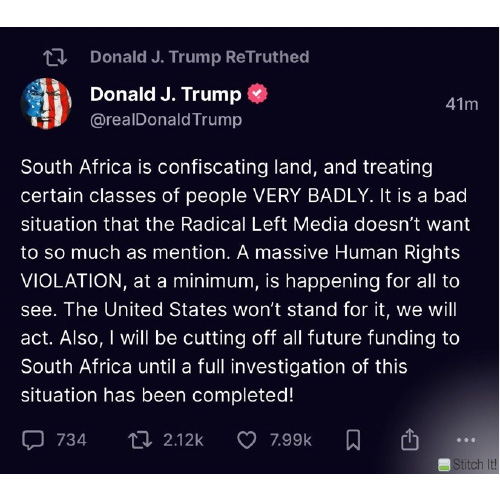On Monday 3rd February President Trump announced plans to cut all future funding to South Africa pending an investigation of land confiscations designed to affect “certain classes of people VERY BADLY.” The class of people Trump was referring to are the white farmers of South Africa now under threat from the recent introduction of a new Land Expropriation Act, signed into law by President Cyril Ramaphosa, which allows for expropriation without compensation (EWC).

The Act replaces the 1975 Expropriation Act which obligated the state to pay the owners of the land it wanted to expropriate for its various state projects. This is the principle of “willing seller, willing buyer” which Nelson Mandela had supported while at the helm of the African National Congress (ANC), South Africa’s ruling party.
In response, the South African President asserted that the “South African government has not expropriated any land” and that the “Expropriation Act is not a confiscation instrument, but a constitutionally mandated legal process that ensures public access to land in an equitable and just manner as guided by the constitution.” It is worth looking at these claims and assessing just how widely the “just”, “equitable” and “in the public interest” safeguards will be construed by the corrupt South African regime.
Chapter 5 of the Act, at 12(3) does provide that “it may be just and equitable for nil compensation to be paid” for the expropriation of land and allows over 400 expropriating authorities to make their decisions on the basis of loosely defined criteria.
But why would the government persecute the farmers?
When Mandela’s party, the ANC, came into power in 1994 after the fall of the apartheid regime, one of their flagship policies was land reform. The goal was to transfer 30% of South Africa’s white-owned agricultural land to black people by 1999 through buy-outs and subsequent redistribution. Some have estimated that around 20% of white-owned farmland has thus-far been redistributed. At least 72% of South Africa’s farmland is currently held by white farmers who make up less than 10% of the population. The ANC is committed to reducing this percentage, and the concern is that this will be done by force.
When Mandela rose to the premiership of South Africa to usher in what he hoped would be a “rainbow nation” post-apartheid, he adopted a markedly different approach to neighbouring Zimbabwe’s Robert Mugabe. Mandela asserted respect for property rights (an essential criterion for a functioning rule-of-law state), expressing his attitude towards the whites in terms of mutuality and participation in the project of nation building:
“Our principal goal is a better life for all South Africans: black and white, farmer and farm-worker. The success of the Reconstruction and Development Programme requires a partnership among all social structures.” (1994 Address)
Mugabe, on the other hand, oversaw the mass displacement of, and violence towards, white farmers which crashed food production in the former “breadbasket of Africa” by 60% over a decade, contracting the economy by 18% per year by 2003. His appalling treatment of the white famers caused mass hunger and malnutrition among the population of Zimbabwe, a country which had previously been a net exporter of food. His justification was simple:
“The land is ours. It’s not European and we have taken it.”
Mugabe publicly criticised Mandela for being “too much of a saint” and being too soft on the whites. The acclaimed documentary Mugabe and the White African, is worth a watch on this subject.
The early pragmatism of the post-apartheid settlement seems increasingly to have been discarded as a host of race-based policies proliferated. The 1998 Employment Equity Act and then the introduction of Broad-Based Black Empowerment (BBEE) in 2003 saw White South Africans increasingly excluded from government contracts and high-level employment in the state and private sectors; by the 2010s the epidemic of violent “farm murders” reached international attention accompanied by the use of the chant “Kill the boer, kill the farmer” by senior figures at ANC rallies such as Julius Malema, who later founded the Economic Freedom Fighters (EFF), the third largest party in South Africa; and by 2017 the ANC formally called for land expropriation without compensation, now signed into law, while Malema continues to call for black South Africans to “occupy the land” owned by whites.
Where Mugabe’s drastic approach to the white farmer question in Zimbabwe shocked the international community drawing condemnation and spooking investors, the trend in South Africa suggests that the ANC has adopted a subtler way to march towards its so-called “national democratic revolution”. In the 2017 memoirs of constitutional lawyer and MP Dr Mario Oriani-Ambrosiani, we find an explanation of this approach from a conversation with President Ramaphosa himself:
“In his brutal honesty, Ramaphosa told me of the ANC’s 25-year strategy to deal with the whites: it would be like boiling a frog alive, which is done by raising the temperature very slowly. Being cold-blooded, the frog does not notice the slow temperature increase, but if the temperature is raised suddenly, the frog will jump out of the water. He meant that the black majority would pass laws transferring wealth, land, and economic power from white to black slowly and incrementally, until the whites lost all they had gained in South Africa, but without taking too much from them at any given time to cause them to rebel or fight.”
The understandable fear amongst the white farmers of South Africa is that opening the door to expropriation without compensation is bringing the pan to boiling point. SABC News has already reported on instances of land invasions directly inspired by the passing of the Land Expropriation Act.
Read it all in Courage Media



